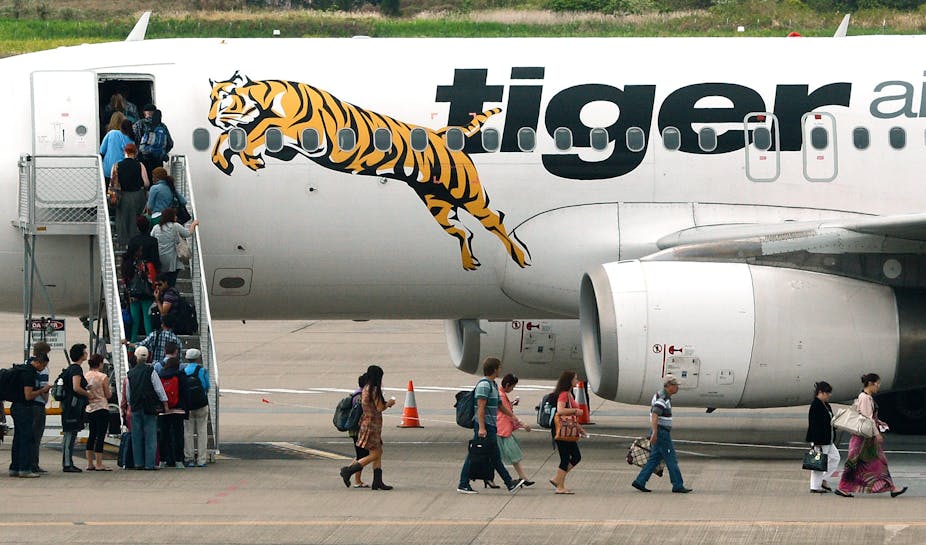Virgin Australia has announced a series of deals which will see it sell a 10% stake to Singapore Airlines, gain a 60% share in low-cost carrier Tiger Airways Australia and challenge the dominance of Qantas in the lucrative fly-in, fly-out market with a $99 million proposed takeover of Western Australian-based airline Skywest.
Senior lecturer at UNSW Aviation, Ian Douglas says the move will help cement Virgin Australia’s move to a premium airline.
Virgin is well on it’s way to becoming a full-cost carrier rather than the low-cost carrier it started out as. A dual brand strategy gives you protection when there is a downturn in the economic cycle. What happens to network carriers in a downturn - and Virgin has international exposure as well as domestically - is the front end premium traffic goes soft and the cargo business falls apart, usually very quickly, leading to significant falls in yields, particularly in international freight yield which can sometimes fall by 50%.
That’s not the market space the low-cost carriers play in, so their yield impact is much smaller. It means they continue to pretty much run the same business model and they can poach traffic from the network carriers on price. The relationship with Tiger gives Virgin the same protection from the business cycle that Qantas has through its low cost carrier, Jetstar.
Internationally both Qantas and Virgin have been building relationships with partner carriers to strengthen their international reach without incurring the cost of mounting their own operations. This announcement is another step in Virgin’s existing partnerships with several carriers that hold equity stakes in the airline. It might prompt Qantas to raise the limitations imposed on the company by the Qantas Sale Act again.
Tiger has only recently regained its full unrestricted operating certificate after it was grounded last July when the Civil Aviation safety Authority (CASA) grounded the airline over safety concerns.
The restriction meant they were allowed to fly only a limited number of flights per day so they were better able to supervise and manage what was happening in the business while they got back on top of the issues CASA had picked up.
(In February, Australia’s other new entrant low cost carrier Air Australia was placed in administration. Tiger is fully owned by Tiger Airways Holdings, which is 33% owned by Singapore Airlines.)
This buyout is probably what Air Australia hoped would happen to them. Had they still be around, I think they would have been waiting for someone to take them out of the market, an irritant that would have been happy to be removed.
Tiger hasn’t been making any money here. For Singapore Airlines Group to get a stake in Virgin and to anchor that relationship in Australian domestic market is valuable. At the same time the opportunity to leverage Virgin’s capabilities offers a way of making Tiger as a partly owned subsidiary more viable. It is a very attractive deal for them.
In terms of synergies, Tiger could be more effective as part of a larger group because they wouldn’t have to duplicate administrative and support structures such as insurance, or fuel buying or hedging.
Virgin has also announced a takeover bid for Skywest, a Perth-based airline which specialises in fly in, fly out charter flights. Virgin already have a strategic alliance with Skywest.
Virgin will gain some strength in the FIFO market. Qantas has been very successful in picking up this traffic with a mix of partners, its regional airline QantasLink and the mainline carrier. Workers fly every ten days, rail, hail, shine, so it’s a guaranteed revenue stream for the business, even as with slowing investment growth in the mining sector.
Should Qantas be worried these moves threaten Jetstar?
Jetstar is not just an Australian domestic carrier - it has a presence in its own right in New Zealand, but is also a franchise carrier in Singapore, Japan, and Vietnam and they are working away at a franchise in Hong Kong. Jetstar is a business with a strategic presence right down the east coast of Asia.
Tiger has already been a low-priced competitor in the domestic market. The change may even moderate competition because Tiger could become more predictable in its structure. Jetstar has a strong presence in enough markets to face any increased competition.
Qantas has had its ‘line on the sand’ of a 65% share of the Australian domestic market for some years. I don’t think that the Qantas Group market share is under any immediate threat from Virgin taking this stake in Tiger. Both Qantas and Virgin have increased domestic capacity over the past 12 months, and both would be wary of driving down yields with any further rapid capacity growth. That means it is unlikely that consumers would see a sudden plunge in domestic airfares. There might be some changes to network structures but I don’t think there will be any major price falls. Particularly as Tiger has been unprofitable.
Tiger’s longer term fleet expansion sees an increase to 35 aircraft by 2018. Spread over six years, the increase equates to one new narrow body aicraft every four months. Qantas and Jetstar jointly operate over 120 B737 and A320 aircraft as well as their wide bodied B767 and A330 fleets in the Australian and Trans-Tasman markets. Virgin have another 80 aircraft flying, so the increase of around four aircraft each year for Tiger will not reshape the domestic market.

